- Home
- J. Clifton Slater
Bloody Water (Clay Warrior Stories Book 3) Page 3
Bloody Water (Clay Warrior Stories Book 3) Read online
Page 3
Chapter 8 - Grain Storage and Hostages
Lantern and torchlight lined the pier but Alerio couldn’t make out details from the flat bottom boat. What he could see was the black hull of a long ship that blocked the light as Cimon and Marcissus paddled them across the inlet. By the time they reached the right bank, the lights of the village on the hills came into view.
“Most of the pirates are in the village,” Cimon commented.
“Let’s hope they stay there,” Alerio replied.
They tied the boat to a post and the three men climbed up the embankment. As they entered the grain fields, Alerio had to nudge Marcissus when the farmer turned left.
“The Legion stockade is just up there,” Marcissus whispered.
“Go further into the field. We need to approach the grain building from the rear,” advised Alerio.
They walked deeper into the field before angling around. When Alerio saw campfires in the distance, he grabbed the farmers and had them squat down.
“Who has experience with a sword?” he whispered.
“I’m good with an ax, but with a sword, no,” replied Marcissus.
“No sword, but I can plow a field all day,” confessed Cimon. “I’m strong.”
“Marcissus. Take this and stay behind me,” Alerio said while handing Marcissus his hip gladius. “Once I clear the guards, you get the elders, the women and the children out of the building. Cimon. You lead them away from the storage building. Marcissus will bring up the rear. If any Illyrians chase you, chop them down like an old pine tree.”
“Like a pine tree?” asked Marcissus.
“You know, big chunks and lots of gooey sap,” replied Alerio. The farmers chuckled and relaxed.
Alerio learned swordsmanship during harvest times on his father’s farm. During his formative years, a Centurion and a Sergeant of the Legion had come annually to work the harvest. While there, they taught former Sergeant Sisera’s son military tactics and gladius work. One of the lessons involved surviving hard and difficult tasks; when faced with the impossible, sing and keep a good sense of humor.
Alerio needed the farmers loose and thinking, rather than freezing up at the first sign of trouble.
“Humor and singing,” Alerio mumbled to himself before asking. “Do either of you know a song?”
He was disappointed when both replied no.
“Marcissus, remember to stay behind me. Cimon stay at the edge of the grain field so you can lead the families deeper into the fields,” Alerio repeated the assignments before stepping forward. “Breath deep, stay loose, and follow me.”
Moments later, Alerio stood stooped over so his eyes were just at the tops of the grain stalks. In front of him was a domed structure. From his vantage point at the edge of the grain field, the building was black and arched shape. It was in the shadows of campfire lights from the far sides. He could see four men sitting at the fires on either side. If the farmers were correct, two more men were somewhere in front of the grain storage building.
From across the inlet and high up on the hill, voices singing carried from the village. In response to the faraway voices, the Illyrians guarding the hostages sat up and joined in the ditty. At the first note, Alerio reached over his shoulders and unsheathed both gladii.
“Look around me, the view never changes;
For I am a rower in the Greek’s navy.
My vista is steady, if not picturesque.
It’s of benches, wood sides, oak oars and dreck,
With a peek at the blue sea, out the oar hole, at its best.
No matter the landfall.
To my eyes and nose, there’s no rest.
For I work on a bench, surrounded by pests.”
“Look around me, the view never changes;
For I am a rower in the Greek’s navy.
His back hairs thicken, on every cruise.
From behind curses, garlic breath, endlessly spews.
Hold your fluids from below, spit flies, gas roars, from on high.
It’s better than farming.
Or hauling big loads, proudly says I.
This life in the navy, without dirt or sky.”
“Look around me, the view never changes;
For I am a rower in the Greek’s navy.
My view on the bench, is a rower’s lament.
Unseen green coast, the blue sea, horizon sunset.
Row faster, slower, cruise, power those oars, and we bank.
No matter the cruise.
To my sight and smell, there’s just planks.
For I work on a bench, surrounded by stank.”
“Look around me, the view never changes;
For I am a rower in the Greek’s navy.
My scene’s consistent, even in battle.
Ship oars, increase strokes, and attack angles.
I row to the drums, I pray, row all the day, as if addled.
No matter the foe.
To my eyes and nostrils, there’s no battle.
For I work on a bench, surrounded by cattle.”
Alerio smiled at the song. The Illyrians and Greeks had been at each other’s throats for decades. It wasn’t hard to understand the song as a barb at Greek oarsmen. Especially those assigned to the center tier in the Greek’s large fleet of triremes.
The smile faded as Alerio stepped out of the grain field and began to sing.
Chapter 9 - Fight on the Right Bank
Alerio hooked around and approached from behind the left campfire. The two Illyrians at the fire were unaware a fight was about to start.
“Look around me, the view never changes,” Alerio sang. “For I am a rower, in the Greek’s navy.”
Swinging inward with the two gladii, his strikes slammed the pirates on their temples. The two fell together and ended up resting on each other.
One pirate near the storage building door wondered why his companions decided to whisper in the middle of a song. His curiosity ended when a single figure leaped over the flame. It landed and raced at him.
“My vista is steady, if not picturesque,” Alerio crooned as he jumped at the third pirate. “It’s of benches, wood sides, oak oars and dreck.”
The other pirate at the door was in full voice with his face lifted as if to compete in volume with the crewmen in the village. He jerked when his partner punched him in warning, but the alert was too late. Alerio ran his gladius through the pirate’s right side. Stepping beyond the crumpling man, he conked his partner on the crown of the head. The singing pirate fell quiet, and toppled to the ground.
“Marcissus. Free your people,” Alerio ordered with a turn of his face. Looking ahead at the final two pirates, he picked up the song, “No matter the landfall. To my eyes and nose, there’s no rest.”
The last two pirates drew long curved knives and shuffled forward in a coordinated attack. Holding their sicas high, they aimed for the Legionary’s unarmored neck. Alerio ran at them, and the Illyrians leaned forward expecting to meet their foe face-to-face.
Two feet from the points of the knives, Alerio dropped to his knees and slide under the sicas. One of his gladius’ tips faced downward and he drove it into the top of a pirate’s foot. Sharp, narrow steel penetrated the foot and the bone split. With his balance gone and agony flashing up from the foot, the pirate collapsed and grabbed at the wound.
The second gladius pointed upward. Alerio pushed it into the pirate’s throat, through the soft palate, and up to the base of the man’s skull where it nicked the bone. Although by the time the nick occurred, the Illyrian was too busy trying to suck air past the gurgling hole in his throat to care. He was the only pirate to die in the fight.
“For I work on a bench, surrounded by pests,” sang Alerio as he stood between the two pirates.
In a straightforward duel or swordfight, killing your foe was easy once you were through their defenses. When attacking a group, it was faster to simply disable the enemy. Except for the last pirate, the other five would survive their wounds.<
br />
***
Alerio spun to check on the four downed Illyrian pirates. Two stirred, but didn’t seem as if they were ready to stand and fight.
Shrieks, wailing, and moaning came from the direction of the grain storage building. Glancing over, Alerio saw a woman emerge through the doorway with two small, limp forms draped over her arms. Behind her, another woman stepped into the torchlight with a dead child cradled in her arms.
“Marcissus. What’s the problem?” Alerio asked. He was unable to comprehend the meaning of the tiny bodies carried by the women.
The farmer turned from where he was helping women and older children step over the threshold.
“The Illyrians killed our young children, and our old men, and our old women,” he said with tears streaming down his face. “Then. Then they tossed the bodies in with the living.”
Alerio grasped why the pirates had eliminated slaves that were unproductive and wouldn’t sell for top coin. Weeding out the weak made sense economically. But, storing the dead with their families was cruel. Cruelty and economics, he understood intellectually. Emotionally, he imagined his own mother, and his two sisters among the dead farmers. He lost his temper.
Chapter 10 - Massacre at Occhio
Two of the pirates were regaining consciousness. They rolled over and placed their hands on the ground to push up. In their confused state, they didn’t understand when hands gripped their collars. The idea, that everything wasn’t as it should be, came to them when they were bodily dragged across the ground, and dropped between two torches.
“I will have the name of your Capitan,” Alerio screamed. His voice carried across the inlet, up the hill, and reached the village.
To no avail, as the pirates were still singing, and his voice was drowned out. He crushed one of the pirate’s ears in his hand and forced the man to his feet. With the other hand, he reached back and drew the Ally of the Golden Valley dagger.
“I will have the name of your Captain,” he repeated while slicing the pirate’s throat.
His voice didn’t carry, but the sight of one of their own gushing blood caught the attention of a few. When the Legionary slung the dying man away and pulled another to his feet, they ran to alert their Captain. By then, the singing was hushed and the crewmen gathered on the hillside.
“I. Will. Have. The. Name. Of. Your. Captain,” shouted Alerio as he drew the curved blade across the other pirate’s throat.
That dying pirate was tossed aside and the Legionary marched to the doorway. He returned dragging two more pirates.
“The name,” he ordered as he placed the point of the knife in a pirate’s ear.
Not waiting for a reply, he drove the blade through the ear and into the man’s brain. Pushing away the dead man, he reached down and pulled the other to his feet.
“The name of your leader?” he yelled. “Where is he?”
A large man shoved through the ranks of pirates and strutted to the very edge of the hill. Two men with torches flanked him so he was well lit although far away.
“I am the leader. Legionary,” the big man shouted.
Alerio held up the knife as if to signal for the man to wait. Then, he stuck the blade through the side of the injured pirate’s neck, and yanked until the blade burst out the front of the man’s throat.
“I asked for your name. Not a conversation,” Alerio yelled back.
Without waiting for a reply, Alerio marched to the last living pirate on the right bank. The wounded man was crying and sobbing as he crawled away from the fate that befell his shipmates. Alerio grabbed the foot with the split bone and dragged the man back toward the touches. There were claw marks in the hard ground where the man attempted to stop the movement with his fingertips.
“Your name,” demanded Alerio of the pirate leader. He pulled the wounded pirate to his feet.
“Navarch Martinus Cetea of the Illyrian Navy,” came the reply. After a pause, he added, “Your name Legionary? I will have your name.”
“Alerio Sisera. Lance Corporal of the Southern Legion,” Alerio spit back. “You murdered the old and the innocent. I will see you on a cross.”
“We are Illyrians. The sea provides. And what she doesn’t, we take. Those who died brought no profit so we made them sport,” Cetea thundered back. “I will gut you. Before you die, you’ll watch as we make sport of every farmer in the village.”
A hand tapped Alerio on the arm. Looking over his shoulder, he saw Marcissus stepping out of blade distance.
“There are pirates sneaking down to the fiumare,” the farmer advised him.
“Go. Get your people as far from here as possible,” Alerio said. “By morning the pirates will be gone. Or they will fall to the Legion. For now, go and hide in the fields.”
Marcissus inched away as if afraid to turn his back on the blood-soaked Legionary. As with most people when confronted by the reality of vengeance, he relished the idea of revenge, but was disgusted by the brutality of the act. And was leery of a man who could extract the full measure of retribution.
“Navarch Martinus Cetea. You will die by my hand,” promised Alerio turning back to face the inlet.
Cetea shifted his stance. From a proud and arrogant stiff back, the pirate leader relaxed. He held his hands out wide as if to show he was unarmed.
“We should talk,” suggested Cetea. “Any man who could overwhelm six Illyrians would be valuable to me. Valuable to the Illyrian Navy. What say you?”
Despite the offer, Alerio knew a war party of Illyrians was creeping down to the shallow, small river. Once across the low summer stream, they’d attack quickly.
“I already have a job. But here’s a parting gift for you,” Alerio said as he jammed the knife between the pirate’s ribs and twisted the blade. “You killed old people and babies. You aren’t a navy, you are pirates.”
With those final words, he let the body fall, faded back out of the light, and ran into the grain field. Moments later arrows fell from the sky. As if planted in ragged rows, the shafts filled the space between the two torches.
Chapter 11 - Signal Fires
Twice an Illyrian pirate screamed out and disappeared in the grain field before a horn sounded. The remainder of the war party sent to deal with the Legionary retreated to the safety of the village and their fellow crewmembers. Although they wouldn’t admit it, they were happy when the recall sounded.
Alerio followed them to the edge of the field. He watched their shadowy figures climb into the riverbed, splash through the stream, and scramble up the far bank. Once he was sure they wouldn’t return to hunt him, or chase the escaped farmers, he turned downstream.
Skirting the wall of the Legion stockade before venturing to the bank of the inlet, Alerio located the path down to the boat. A misstep as he climbed down sent him sliding into the water. While standing in it knee deep, he took time to rinse off his hands before stepping into the flat-bottomed boat. Rather than paddling across to the far bank, he aimed the boat toward the strait.
A short while later, the water became rougher as the inlet met the Messina strait. At the mouth of the inlet, he beached the boat.
“Most of the women and children are safe,” Alerio stated as he entered the ring of farmers. Then he delivered the bad news, “Unfortunately, the Illyrians killed the oldest and youngest of your families.”
Gasps and curses came from many of the farmers at the announcement. Ignoring the anguish of the grieving men, Alerio asked about the wounded Lance Corporal.
“He’s the same. Which is good considering his injuries,” a farmer replied.
Alerio found an unoccupied tree and sat down. He closed his eyes as he leaned against the trunk. Someone placed the waxed firebox in his lap.
“Wake me at first light. Or if the pirates row out,” he said.
“But what happened at the grain building?” another farmer asked. “Who’s dead and who’s alive?”
“You’ll have to ask Cimon and Marcissus in the morning,” Alerio repli
ed. “I was busy having a conversation with Navarch Martinus Cetea.”
“You were talking to the pirate leader?” another farmer asked.
“Just a brief chat. I think we came to an understanding,” Alerio stated.
“An understanding? What understanding?” inquired the farmer.
“That one of us will die when we met again,” Alerio said as he dozed off.
It was still dark when a hand shook Alerio awake.
“The Illyrians are boarding their ship,” announced a farmer.
Drifting down from far up the inlet, male voices shouted unintelligible orders. Individually an oar wouldn’t make enough noise to reach Alerio and the farmers. But one hundred and twenty oars clicking into place was a cacophony that traveled.
Alerio pulled his knife and sliced away the wax. In the box were dry shavings of wood, a flint, and a small iron bar.
As the kindling flared to life, a farmer commented, “Won’t the pirates see the fire.”
“If they do, it’ll be on the beach,” Alerio informed him, but he also warned the farmer. “They may shoot arrows into the trees as they row out. Everyone move away from the beach.”
Alerio stood up carefully with the burning kindling and walked to the depression in the beach. After laying the fire in the small pit, he blew on the branches until the flames flared assuring him the fire would burn until he returned.
A drum beating a slow rhythm announced the Illyrian vessel before it appeared in the predawn light. Alerio jogged back to the trees. Finding a thick one, he scooted in behind the trunk and watched the inlet.
The ship was about eighty feet long and ten feet across the middle. Two banks of thirty oars dipped into the water in time with the drum. Alerio figured with sixty oarsmen on each side plus commanders and sailors, the Illyrian pirates numbered at least one hundred and seventy-one when they arrived. Now they rowed out with eight less. He wished it could have been fewer.
Behind the Illyrian bireme, a merchant ship rowed slowly down the inlet. Only six oars propelled it. Even with the slow pace of the larger vessel, the underpowered transport was falling behind.

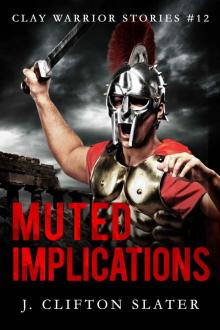 Muted Implications (Clay Warrior Stories Book 12)
Muted Implications (Clay Warrior Stories Book 12)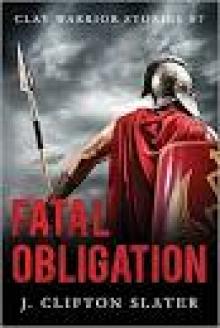 Fatal Obligation
Fatal Obligation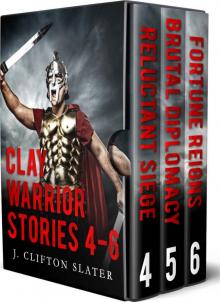 Clay Warrior Stories Boxset 2
Clay Warrior Stories Boxset 2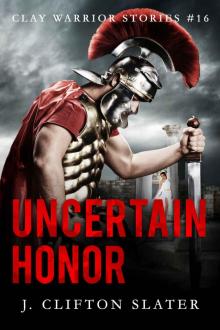 Uncertain Honor
Uncertain Honor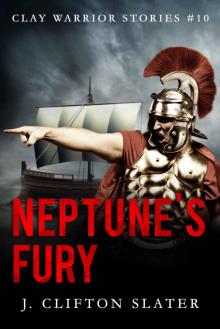 Neptune's Fury
Neptune's Fury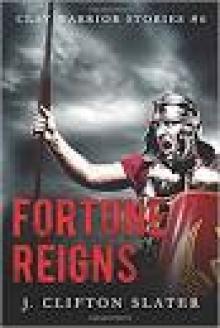 Fortune Reigns
Fortune Reigns Op File Treason
Op File Treason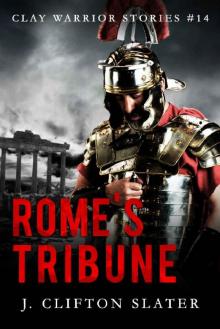 Rome's Tribune (Clay Warrior Stories Book 14)
Rome's Tribune (Clay Warrior Stories Book 14)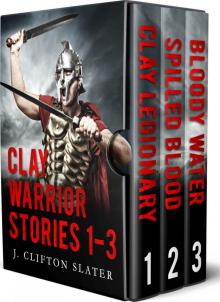 Clay Warrior Stories Boxset 1
Clay Warrior Stories Boxset 1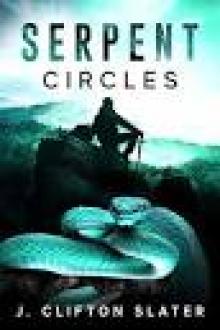 Serpent Circles
Serpent Circles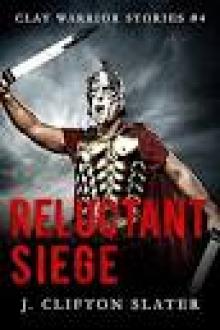 Reluctant Siege
Reluctant Siege Infinite Courage
Infinite Courage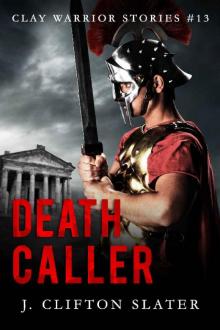 Death Caller (Clay Warrior Stories Book 13)
Death Caller (Clay Warrior Stories Book 13) Op File Sanction
Op File Sanction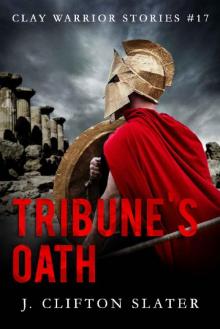 Tribune's Oath (Clay Warrior Stories Book 17)
Tribune's Oath (Clay Warrior Stories Book 17) Galactic Council Realm 1: On Station
Galactic Council Realm 1: On Station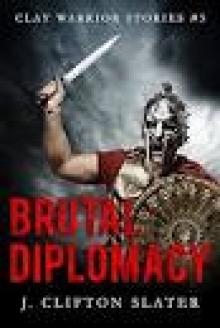 Brutal Diplomacy
Brutal Diplomacy Op File Revenge
Op File Revenge On Point
On Point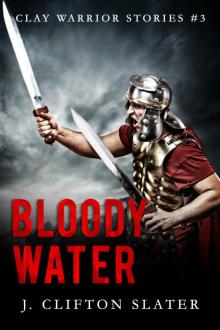 Bloody Water (Clay Warrior Stories Book 3)
Bloody Water (Clay Warrior Stories Book 3)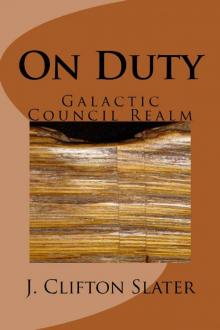 Galactic Council Realm 2: On Duty
Galactic Council Realm 2: On Duty Galactic Council Realm 3: On Guard
Galactic Council Realm 3: On Guard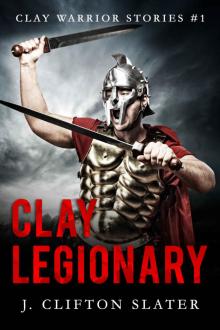 Clay Legionary (Clay Warrior Stories Book 1)
Clay Legionary (Clay Warrior Stories Book 1) On Point (Galactic Council Realm Book 4)
On Point (Galactic Council Realm Book 4) Op File Revenge (Call Sign Warlock Book 1)
Op File Revenge (Call Sign Warlock Book 1)